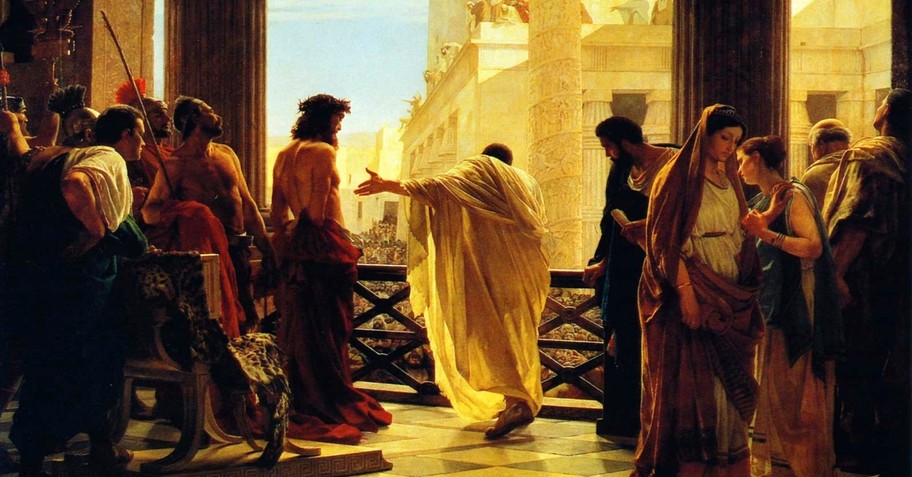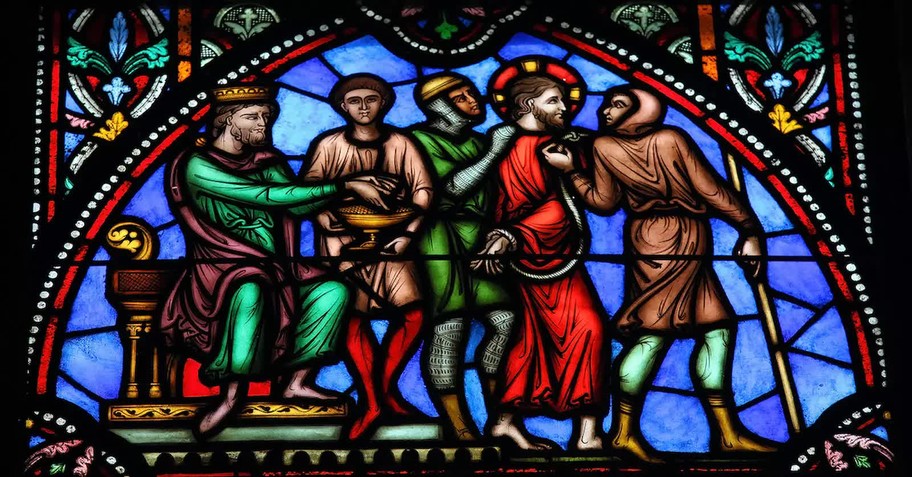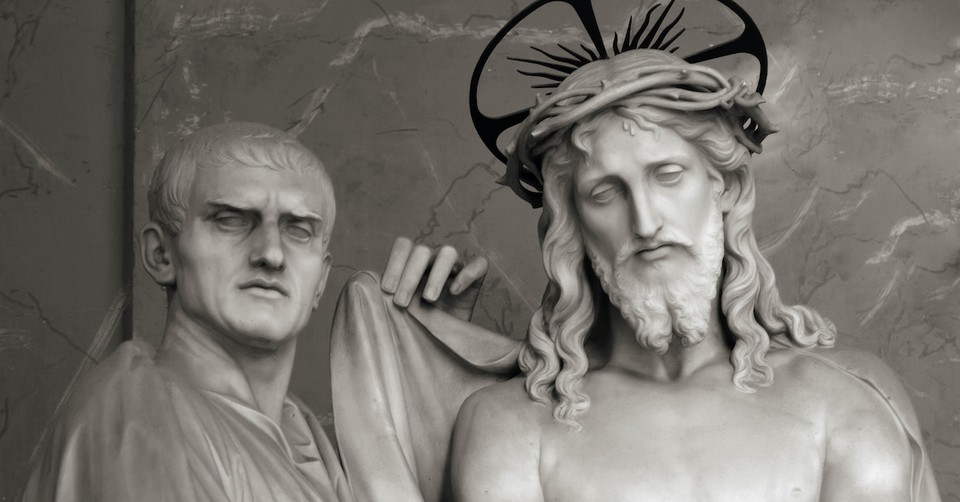"When morning came, all the chief priests and the elders of the people took counsel against Jesus to put him to death. And they bound him and led him away and delivered him over to Pilate the governor." ~ Matthew 27:1-2
The life of Pontius Pilate is difficult to accurately trace outside of his stature as a Roman ruler. Artifacts with his image and name place him unquestionably in history, and the Bible records his presence at the scene of Jesus’ trial to be crucified. Some regard him as a martyr, and others remember him as a brutal ruler. As Christians, we know God is purposeful in all He does. As we attempt to uncover and decipher the exact events of ancient history, one thing is remarkably clear: God’s love story with His people continues on, generation after generation, and Pontius Pilate appears in one of the most poignant scenes in history.
Photo credit: ©GettyImages/PaoloGaetano

Pontius Pilate and Jesus Christ
Then the Jewish leaders took Jesus from Caiaphas to the palace of the Roman governor. By now it was early morning, and to avoid ceremonial uncleanness they did not enter the palace, because they wanted to be able to eat the Passover. So Pilate came out to them and asked, “What charges are you bringing against this man?” “If he were not a criminal,” they replied, “we would not have handed him over to you.” Pilate said, “Take him yourselves and judge him by your own law.” “But we have no right to execute anyone,” they objected. This took place to fulfill what Jesus had said about the kind of death he was going to die.
Pilate then went back inside the palace, summoned Jesus and asked him, “Are you the king of the Jews?” “Is that your own idea,” Jesus asked, “or did others talk to you about me?” “Am I a Jew?” Pilate replied. “Your own people and chief priests handed you over to me. What is it you have done?” Jesus said, “My kingdom is not of this world. If it were, my servants would fight to prevent my arrest by the Jewish leaders. But now my kingdom is from another place.” “You are a king, then!” said Pilate. Jesus answered, “You say that I am a king. In fact, the reason I was born and came into the world is to testify to the truth. Everyone on the side of truth listens to me.” “What is truth?” retorted Pilate. With this he went out again to the Jews gathered there and said, “I find no basis for a charge against him. But it is your custom for me to release to you one prisoner at the time of the Passover. Do you want me to release ‘the king of the Jews’?” They shouted back, “No, not him! Give us Barabbas!” Now Barabbas had taken part in an uprising.
Image credit: Flickr

Who Was Pontius Pilate according to History?
Pontius Pilate is best known for presiding over Jesus’ trial and ordering his crucifixion. He was an officer of the Roman empire, serving as procurator, or prefect, of Judea, managing the financial affairs and flexing administrative powers on behalf of the emperor. Pilate was the heir of the Roman family of Pontii. The name Pilate indicates he was probably a descendant of a "freedman." “A former slave set free … under Roman law, might become a citizen if the proper legal form was followed,” Britannica defines, “although he did not enjoy full civic rights.”
His full Latin name, Marcus Pontius Pilatus, was of Samnite origin, an ancient tribe eventually absorbed by the Roman empire. Britannica explains, “Pilate was a Roman equestrian (knight) of the Samnite clan of the Ponti (hence his name Pontius).” He was a middle-class Roman citizen, ruling under Emperor Tiberius. His reign, from 26 to 36, stretched across the ministry of John the Baptist and Jesus Christ.
Pilate’s political position gave him military power, though his soldiers mainly policed civilian life. He was head of the judicial system, with the power to inflict capital punishment. Coins have been found bearing his image because as Roman governor he had control of the monetary system and collection of taxes. Pilate held a small allotment of civil control over the Sanhedrin, the body of Jewish leaders who acquitted Jesus, which would explain why they came to him for the order to crucify him. Pilate also had the power to appoint the high priest.
Roman rulers were renowned for their brutality and corruption, but Pilate’s reputation superseded most. In 50 AD, Jewish philosopher Philo of Alexandria supposedly reprimanded him severely for his “briberies, insults, robberies, outrages and wanton injuries, execution without trial, constantly repeated, ceaseless and supremely grievous cruelty.”
Pilate’s hatred for the Jews was intense, and he deliberately infuriated them. Under Jewish law, images of the Roman government were forbidden in Jerusalem, but Pilate once allowed troops to carry shields with the Roman Emperor Tiberius into the city. “A great crowd traveled to the Judean capital of Caesarea in protest and lay prostrate around Pilate’s palace for five days until he relented,” wrote Christopher Klein.
Some sources indicate Pilate died in 36, committing suicide after being banished to Vienne in Gaul, accused by the governor of Syria for attacking unarmed Samaritans who were hoping to unearth artifacts buried on Mount Gerizim by Moses. Other sources say he simply retired, or his post as governor of Judea was up, and he either didn’t choose to return or was reassigned. His death, much like his early life, is difficult to trace with reliable accuracy. To some, he is considered a Christian martyr, because of the way the New Testament accounts portray him as hesitant to execute Jesus.
Photo credit: ©GettyImages/Jorisvo

What Does the Bible Say about Pontius Pilate?
“Do you refuse to speak to me?” Pilate said. “Don’t you realize I have power either to free you or to crucify you?”
Jesus answered, “You would have no power over me if it were not given to you from above. Therefore the one who handed me over to you is guilty of a greater sin.” - John 19:10-11
Luke 13:1 speaks of how brutal Pilate could be, sprinkling the blood of Galileans over their sacrifices. He deliberately found ways to disrespect their traditions and beliefs, “and in times of irritation freely shed their blood,” Easton’s Bible Dictionary records.
The political climate between the Jews and Pilate was a toxic, mutual feeling of disdain. Pilate was sent to Judea routinely to keep the peace during Passover. It was at this time Jesus was brought to him. “The council wanted him to pronounce this man guilty of capital treason,” John Bloom wrote for desiringGod.com, “Pilate resented the pressure. His patience strained at the seams.”
Hearing Jesus was from Galilee, Pilate sent Jesus to Herod Antipas, who sent him back to Pilate donning a purple robe in mockery. Pilate eventually bowed to the demands of the people, ordering Jesus to be scourged. “This scourging was usually inflicted by lictors,” notes Easton’s Bible Dictionary, “but as Pilate was only a procurator he had no lictor, and hence his soldiers inflicted this terrible punishment.”
Pilate appears in both the Apostles and Nicene creeds. The only other people mentioned in those sacred prayers are Jesus and His mother, Mary. The phrase, “Jesus suffered under Pontius Pilate” confirms his presence in that historical moment.
Knowing Jesus was innocent, Pilate tried on four occasions to free him. In John 18:33, “Pilate went back inside the palace, summoned Jesus and asked him, ‘Are you the king of the Jews?” A moment with the Son of God clearly tormented Pilate. (John 18:28-19:16.) He was no stranger to persecuting the Jews, and yet he could not find fault with Jesus. Following a custom of Passover to release one prisoner, Pilate offered to free Jesus! His wife rushed in to warn him not to execute this ‘just man,’ yet Pilate caved in fear of the threats being made against him (John 19:14-16). “Pilate knew Jesus had committed no crime worthy of death,” wrote Dr. Ray Pritchard, “But like many a politician caught between a rock and a hard place, he caved in to pressure from the Jewish leaders who wanted Jesus dead.”
Photo credit: ©Unsplash.com/AaronBurden

What Do We Know about Pilate's Wife?
“While Pilate was sitting on the judge’s seat, his wife sent him this message: ‘Don’t have anything to do with that innocent man, for I have suffered a great deal today in a dream because of him.” - Matthew 27:19
Pilate’s wife does not appear by name in the Bible. The Gospel of Nicodemus, an Apocryphal book, identifies her as Claudia Procula, granddaughter of the Emperor Augustus. “Apocryphal books were not recognized as the word of God by their writers, Christ, nor the Apostles,” notes Christianity.com. Though these books are not on equal ground with Scripture, they can sometimes aid historical inquiry. According to texts outside the Bible, she was highly influenced by the Jewish faith and was possibly a convert to Judaism.
This woman’s dream caused her husband to pause. “In all the long hours when Jesus stood on trial, only one person spoke up for him,” Dr. Ray Pritchard wrote. The actual conversations of Pilate and his wife prior to witnessing Jesus’ footsteps in their midst are unknown, but both were clearly affected by him. “Calling Jesus the ‘just man’ testifies to the impression He had made on her mind in contrast to the religious leaders seeking to destroy Jesus because of His claim,” states BibleGateway.com; “Pilate’s wife sensed her solemn responsibility and made her plea, even though her husband who was also convinced of Christ’s innocence, ultimately delivered Him to be crucified.”
Photo by Ahmet Sali on Unsplash

Why Are Pontius Pilate and His Wife Important in the Resurrection Story?
What we know historically about Pilate would not predict his hesitation at the execution of a Jew. He profoundly and outspokenly hated them. Pilate, a brutal leader, expressed compassion on Christ. Only God knows whether he was entangled in envy and authority, or possibly experiencing the very presence of God.
John 19:33 says, “Pilate then went back inside the palace, summoned Jesus and asked him, ‘Are you the kind of the Jews?’” Pilate wanted to speak to Jesus away from the insightful crowd, who should have been on Jesus’ side. The accusation made him curious. Pilate’s wife was a woman of Gentile lineage, wife to a Roman leader and granddaughter to a Roman emperor. Yet, she was the only one to come forth and speak on Jesus’ behalf while He stood trial. The profound effect of Jesus on Pilate and his wife is significant in the resurrection story.
Jesus came for all of us. Gentiles and Jews! God has the power to redeem any and all of our hearts. Neither Pilate nor his wife were of Jewish heritage, yet here they are playing a part in the greatest story of all time. Pilate’s wife had a profound dream that led her to conclude Jesus as a “just man.” She was no stranger to the Jewish Scriptures.
Pilate’s sinful life and terribly wrong choice to crucify Jesus became part of God’s sovereign plan. “Our comfort comes not from the powerlessness of our enemies, but from our Father's sovereign rule over their power,” John Piper stated “Pilate (and all Jesus’ adversaries- and ours) meant it for evil. But God meant it for good (Genesis 50:20).”
Could it be possible these two outsiders recognized Jesus more than the Jewish people who were supposed to know unequivocally who He was? The death and resurrection of Christ left a historical footprint in time and permanent freedom from sin for all those who embrace Jesus as Savior.
Photo credit: ©GettyImages/Alessandrophoto

Should Christians Feel Sorry for Pilate?
“When Pilate saw that he was getting nowhere, but that instead an uproar was starting, he took water and washed his hands in front of the crowd. ‘I am innocent of this man’s blood,’ he said. ‘It is your responsibility!’” - Matthew 27:24
Pilate knew Christ was innocent but lacked the moral fiber to face the mob with a verdict against their wishes. He attempted to default responsibility of Jesus’ crucifixion to the people demanding him to make the decision. Alexander MacLaren wrote in “The Wearied Christ,” “His impotent effort to cast off responsibly only witnessed to his consciousness of it.” Unfortunately for Pilate, any attempt to disassociate himself with the decision he made is futile.
Scripture clearly states we are each responsible for our own choices and will suffer the consequences for our sin as God rightly judges. Oppressive leaders like Pilate make decisions that affect the people they lead. But God assures us in Genesis 50:20: “As for you, you meant evil against me, but God meant it for good, to bring it about that many people should be kept alive, as they are today.” Christians needn’t feel sorry for Pilate, but we can lend compassion. God knows the finite details of His heart. In regard to Pilate, and other corrupt rulers, we needn’t justify the obvious tyranny and sin in his life. However, we can choose to leave it in God’s hands.
There is a lesson in leadership tucked into the folds of the few reconcilable facts we can glean from Pilates life. “We should never point to our own prestige and power, abusing the authority we have over others. “All authority comes from God’ is to be our mantra,” wrote Trevin Wax, “We are vessels of God’s authority, and how we exert the authority delegated to us ultimately reveals the kind of God we believe in.” Jesus kept His Father’s love on the throne of His heart, all the way to the cross.
Photo credit: ©GettyImages/rudall30
Sources:
Biblegateway.com, “Pilate’s Wife”
Brittanica.com, “Freedman,” “Pontius Pilate,” “Prefect”
Christianity.com, “What Is the Apocrypha?”
Crosswalk.com, “Pilate’s Wife”
DesiringGod.org, “Why Was Jesus Unintimidated by Pilate?” and “The Faithful Will Look Foolish – For Now”
EastonsBibleDictionary.org, “Pilate, Pontius”
History.com, “Why Pontius Pilate Executed Jesus”
TheGospelCoalition.org, “A Guide to the Entire Cast of Characters During Jesus’s Final Week” and “Pilate, Jesus, and True Authority”
Originally published February 19, 2020.








